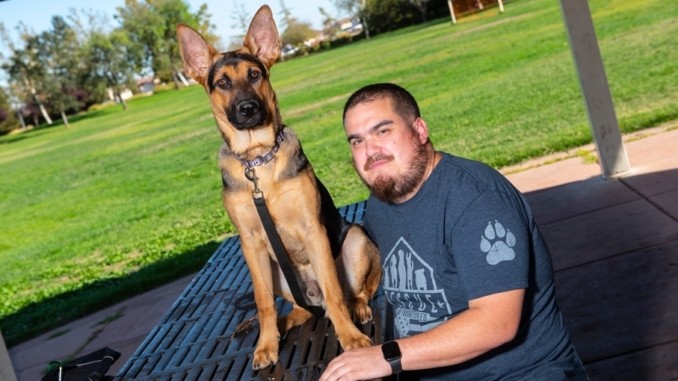
Jayne Goad has long held a place in her heart for German Shepherds. Starting in 2001, she began rescuing German Shepherd dogs, and in 2009 an organization named Golden State German Shepherd Rescue started operations. It was only natural that Jayne would get on board. Over the years, she’s held positions in the organization including secretary, evaluator, foster, foster coordinator, adoption counselor, and adoption day manager. In March, she took over as president.
Part of GSGSR is the SAVE program, which stands for Shepherd And Veteran Enablement. “Our mission is to match military veterans with rescued companion dogs and make it easy for them to adopt,” Jayne says. While some of the dogs from the rescue will become certified service dogs, that isn’t the only role they can play in a veterans life. “We focus on the level before service dog, what we refer to as a companion dog,” Jayne says. “Think of it as a great family pet.”
Over 900 dogs have been placed with families since GSGSR began, and a few have been placed specifically with veterans through the SAVE Program.
The goal is for animals rescued from the Northern Central Valley to be paired with veterans experiencing post-traumatic stress or anxieties that arise with a return to civilian life. “Having a companion dog brings affection, fun, and a sense of purpose into their lives,” Jayne says. “When the dog licks your face, you’ve got to get off the couch and go play. That’s a good thing when you are feeling depressed.”
Veterans often elect to complete a higher level of training to meet specific needs, but every German Shepherd through GSGSR is placed immediately into a foster home where fundamental training begins. “We work hard to make the adoption process easy for our adopters, both veteran and non-veteran. For our veteran adopter, we speak to the veteran and/or caregiver to assess their specific needs. It may be as simple as the dog joining the veteran on walks to get them out of the house or introducing purpose into their lives when they have to train, feed, and care for another.”
Next, a specific match is suggested by the rescue to ensure the dog and human handler best meet each other’s needs. “We take a lot of pride and care with this step, which has resulted in a very low return rate,” Jayne says. “This is better for all the dogs and humans involved.”
Andrew & Maverick
Andrew Martinez was a 38B Civil Affairs Specialist in the Army. He deployed to Iraq in 2008-2009. On his first deployment, he was wounded when a suicide bomber detonated a suicide vest near his foot patrol. “Three soldiers died and ten were wounded,” Andrew shares. “I had multiple shrapnel wounds and a TBI. I was separated from the military early.”
Fast forward to 2022, Andrew’s girlfriend Kelly, who has long been fostering dogs, convinced Andrew to get a foster dog through GSGSR. He is what rescues typically refer to as a failed foster, meaning the family ends up adopting the dog instead. “Maverick is six months and full of energy,” Andrews says.
Because Maverick became so quickly attached the Andrew, he decided to keep him. “Ever since we got him, he has always been by my side. He loves to play with the other dogs and loves to eat. He is very food motivated and loves meeting new people,” Andrew says.
Maverick is currently in the process of being trained and certified as a service dog for Andrew. “German Shepherds can be very obedient and have a good temperament. They are very smart, hard-working, and devoted to their family,” Andrew says.
After Maverick finishes his initial training and learns basic commands, Andrew is going to apply for a second program that trains service dogs pro bono for veterans and first responders.
“Maverick is more than a rescue dog,” Andrew says. Even though Maverick hasn’t started his formal service dog training yet, he’s already displaying the behaviors expected of many companion dogs. “He is very in tune with me and seems to know when I am not feeling well; physically or mentally. He loves to cuddle with me during the night. There have been times where I was in physical pain and he has tried to lick the areas where I am hurting like he knows that I am in pain. There have been times where I have been experiencing mental health symptoms and he has laid calmly with me and placed his head on my lap.”
Andrew and Kelly also continue to foster other dogs, bringing in temporary playmates for Maverick and continuing to help alleviate some of the burden placed on local shelters. “It is hard at times to give up foster dogs that you have grown attached to,” Andrew says. “But that just means that we are able to get another dog out of the shelter.”

Bryce & Kylo
Bryce Carter joined the army in 2004 before he even graduated high school. For four years he served in the 4th Infantry Division and deployed to Iraq. “I held two positions [with the 4th Infantry Division]. My first position was a weapons trainer for the 8th Division of the Iraqi Army. I was tasked with teaching the Iraqi Army all about their soviet weapons, how to use and care for them, and as a whole with my other small team how to effectively conduct operations.” At his home base in Fort Hood, Bryce started winning competitions. “I won the company, and battalion soldier of the month boards. I also attended the Army’s Leadership school where I finished as an honor graduate on the Commandants list. I was then quickly promoted to Sergeant,” he shares.
When he deployed again, Bryce went ahead of his unit to prepare the accommodations and training. He then transitioned to intelligence gathering in Baghdad, the initial job he was trained for. “I remained in that position until my departure from the Army in 2008.”
Kylo is a three-and-a-half-year-old male German Shepherd. “When we first received Kylo we were informed that he was a stray from Stockton. He was very much underweight and didn’t really know how to be a dog, meaning that he didn’t really know how to interact with other dogs,” Bryce says. Despite his lack of weight, Kylo is a big dog, which can be intimidating, but Bryce says he has a calm demeanor that is “very special.”
Kylo plays well with the family’s other dog, Kane, but aside from that, he hasn’t taken to playing much with other dogs or humans. He’s protective if a dog gets aggressive with a member of his family, but that’s about it. “Kylo much prefers to come to you lay on his back and have you rub his belly,” Bryce says.
Kylo has adapted well to being a service dog and loves to work. “When Kylo gets his vest and leash on he knows it’s time to go to work and his demeanor immediately changes. He is more alert, he stays very close to my side, and does everything he was trained to do.” Kylo is most vocal when he gets left behind. “I am very much his service human as he is my service dog,” Bryce says.
It was actually Bryce’s wife Julie who found Kylo. After halting his long search for the right rescue dog out of frustration (and attending classes without a dog in the meantime to learn what he could), Julie stayed persistent. That’s how she found Jayne and eventually Kylo.
“Kylo came into my life… the moment I needed him the most,” Bryce says. “It turns out it was also the moment he needed us as well.”

